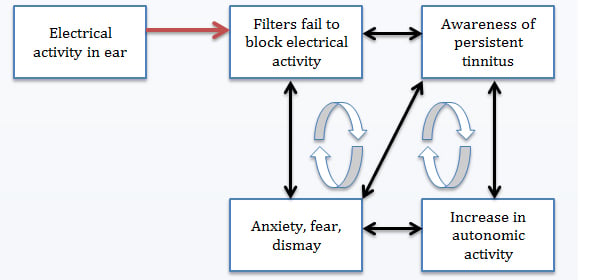
What is tinnitus? Tinnitus originates from the Latin word ‘tinnīre’, which means to ring. Tinnitus is the conscious awareness of a sound sensation that is not due to an external sound source. Although the word tinnitus is derived from the word ‘to ring’, many people experience tinnitus as other forms of sound. These might include buzzing, whistling, static, screeching, hissing or roaring.
| Subjective Tinnitus | Objective Tinnitus |
| The perception of sound without an external acoustic stimulus. It is heard only by the patient | Much less common and results from noise made by structures near the ear. It can sometimes be loud enough to be heard by an audiologist using an amplification device |
| 95% of tinnitus cases | 5% of tinnitus cases |
| Associated with tonal tinnitus | Associated with somatic tinnitus |
| Defined tones which can change e.g. ringing or whistling | More likely to be pulsatile in rhythm with a person's heart beat |
| Can be caused by hearing loss, trauma, shock, stress | Can be caused by blood flow difficulties |
The Auditory System & Tinnitus
When we hear a sound it is a result of noise being converted into electrical impulses that are sent to the brain for interpretation. Sound energy enters the inner ear, specifically the cochlea and causes a membrane to vibrate. The vibration of the membrane moves the protein rods of the inner hair cells and this mechanical energy is changed to electrical impulses by these cells. It is these electrical impulses that are sent to the brain for interpretation.
Our brain decides what we need to hear and what we do not. For example if you were walking along a road you would be able to hear the cars passing by. If an aggressive dog started barking near you, your brain would prioritise the barking sound of the dog as it could be dangerous and the sounds of the cars would recede into the background.
All of us have electrical activity in the ear all of the time. The reason we are not aware of it is that we filter out this sound because it is part of us and it does not serve us to listen to it. The same is true of our noses. Because it is there all of the time it makes no sense to be aware of it.
When our hearing system is not functioning properly we become aware of the internal workings of the ear and we are not able to filter them out. This is what we call tinnitus.
Experiments carried out in America, showed that over 90% of subjects who did not have tinnitus experienced some form of sound when placed in a sound proofed room. The reason why so many of the respondents were aware of a noise was because they were hearing the internal workings of their auditory system. With no external sound to cover over the noise of their internal hearing function they became more aware of it.

When we hear we use our hearing function and two separate parts of the brain. These are the auditory cortex and the limbic system. The auditory cortex makes us aware of the sound. The limbic system deals with our emotional response to the sound. If the sound is considered to be threatening our limbic system activates the sympathetic arm of our autonomic nervous system. This means we have identified the tinnitus stimulus as a threat and we activate a stress type response in order to help us neutralise the threat. Of course this is not helpful or needed but this is what causes the anxiety and stress you might experience with problematic tinnitus.
Problematic Tinnitus

The difference between someone who has tinnitus and problematic tinnitus is that a person who experiences problematic tinnitus has identified it as a threat and their limbic system has engaged the sympathetic nervous system.
Our Tinnitus Counselling will help you to turn problematic tinnitus into tinnitus and reduce tinnitus symptoms by way of our psychological approach to tinnitus retraining therapy.
